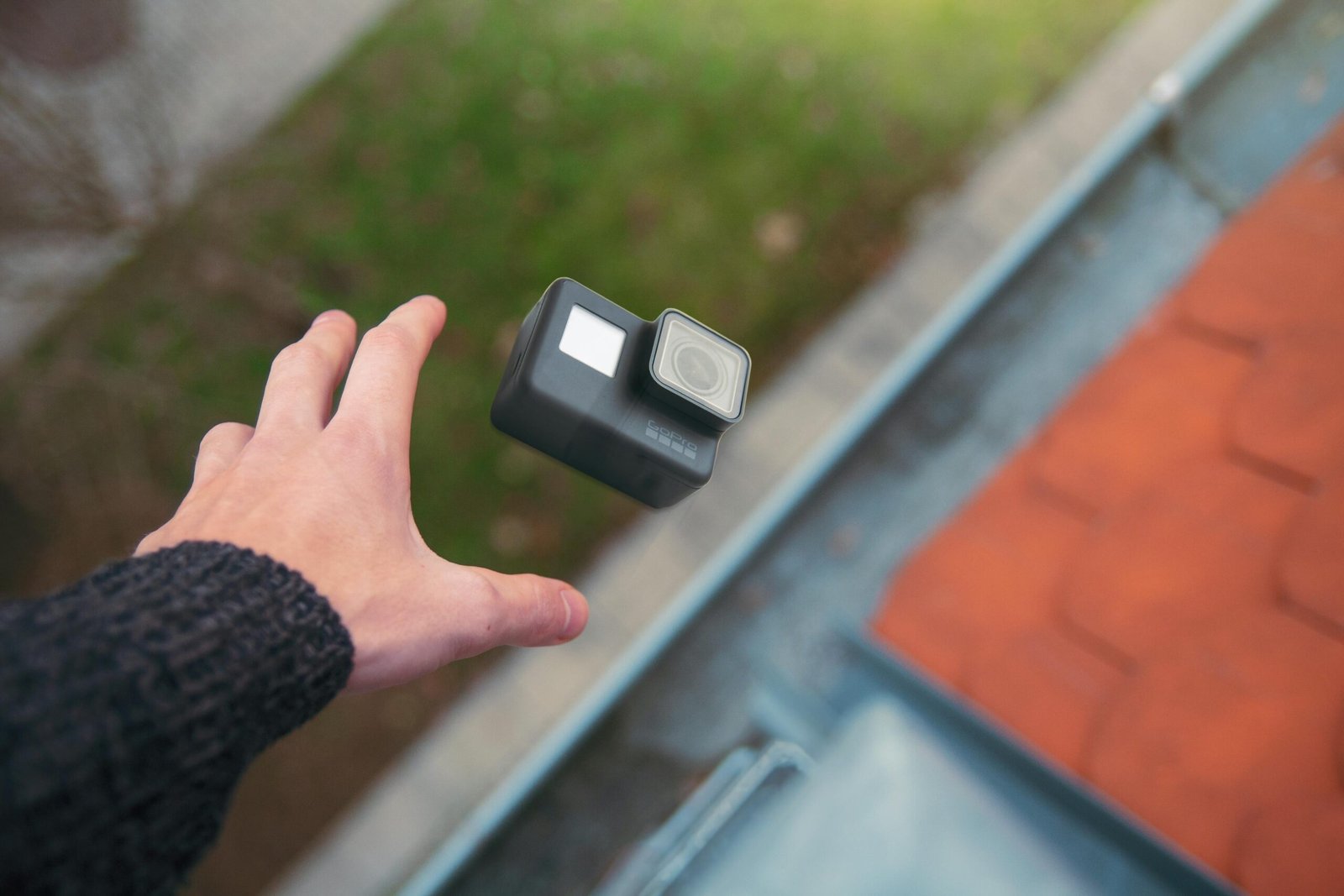Outdoor Photography: Action Cameras Buying Guide for Adventurers

Introduction
Capturing the thrill of outdoor adventures—whether it’s mountain biking down rugged trails, surfing in crystal‑blue waves, or skydiving over breathtaking vistas—requires a camera that can keep up with the action. Traditional DSLRs and mirrorless systems are superb for stills and controlled shoots, but for hands‑free recording, extreme durability, and compact portability, action cameras reign supreme. Today’s top models offer 4K and even 5.3K video, image stabilization rivaling gimbals, waterproof housings, and interchangeable mounts that fit helmets, handlebars, and more.
Yet with so many action cameras on the market, selecting the right one for your sport photography can feel overwhelming. Some prioritize maximum resolution and frame rates, others excel in low‑light stills, and certain models offer advanced features like GPS, voice control, and live streaming. This guide distills our months of field testing across varied environments—rock faces, rapids, desert dunes, and alpine summits—into a concise resource. We’ve evaluated ten of the best action cameras on parameters including:
- Video Resolution & Frame Rates: Ultra‑high‑definition capture at smooth speeds.
- Image Stabilization: Electronic vs. mechanical stabilization performance in dynamic motion.
- Photo Quality & Modes: Burst shooting, RAW capture, time‑lapse, and night photography.
- Durability & Waterproofing: Ratings to depths of 60 m and resistance to drops, dust, and temperature extremes.
- Battery Life & Charging: Endurance in the field and fast‑charging options.
- Mounting & Accessories: Ecosystem breadth, including mounts, filters, and power banks.
- Connectivity & Workflow: Wi‑Fi, Bluetooth, GPS tagging, and smartphone app control.
Following our Top 10 ranked picks, you’ll find:
- A Comparative Summary Table of key specs.
- An Outdoor Use Cases Guide mapping camera features to specific sports.
- A Buying Guide detailing must‑have features for different adventure types.
- Pro Tips for mounting, shooting, and editing your outdoor footage.
- FAQs addressing common action‑camera questions.
- A Field‑Ready Kit Checklist to ensure you never miss a moment.
Whether you’re a trail runner, scuba diver, or snowboarding thrill‑seeker, this guide will help you choose—and maximize—the action camera that turns your adrenaline‑pumping moments into stunning, shareable memories. Let’s dive in!
Top 10 Action Cameras for Outdoor Photography
Below are our top ten action cameras, ranked by overall performance, durability, and value for sport photographers and adventure vloggers.
1. GoPro HERO12 Black
Key Features:
- Video: 5.3K @ 60 fps; 4K @ 120 fps; 2.7K @ 240 fps
- Photo: 27 MP stills; RAW capture
- Stabilization: HyperSmooth 6.0 with horizon leveling up to 360°
- Waterproof: 10 m (without housing); optional Dive Housing to 60 m
- Battery Life: ~2 hours of 4K/60 fps recording per Enduro battery
Specifications:
| Spec | Details |
|---|---|
| Sensor | 1/1.9″ CMOS |
| Mount | Integrated GoPro mounting fingers |
| Connectivity | Wi‑Fi, Bluetooth, GPS, USB‑C |
| Dimensions | 71.8 × 50.8 × 33.6 mm |
| Weight | 155 g |
Pros:
- Best‑in‑class stabilization and high‑resolution video
- Rugged, field‑tested design with a large accessory ecosystem
- Quickly switchable PowerPacks (batteries)
Cons:
- Premium price point
- Overkill for casual users
Why We Love It:
The HERO12 Black remains the undisputed champion for outdoor videography, offering pro‑level resolution, buttery stabilization, and a vast mount/accessory ecosystem. From base jumps to underwater cave dives, it captures every motion crisply.
2. Insta360 X4
Key Features:
- Video: 5.7K 360° capture @ 30 fps; 4K flat mode @ 60 fps
- Photo: 18 MP 360° stills; HDR photo
- Stabilization: FlowState stabilization in both 360° and reframed modes
- Waterproof: 10 m; no external housing needed
- Battery Life: ~85 minutes continuous in 360° mode
Specifications:
| Spec | Details |
|---|---|
| Sensors | Dual 1/2.3″ CMOS (180° each) |
| Mount | Standard tripod mount + action mounts |
| Connectivity | Wi‑Fi, Bluetooth, USB‑C |
| Dimensions | 48 × 48 × 130 mm |
| Weight | 180 g |
Pros:
- Unique 360° capture lets you reframe ultra‑wide outdoor shots
- Excellent stabilization in all directions
- Waterproof without extra gear
Cons:
- Editing 360° footage has a learning curve
- Lower single‑direction resolution than dedicated action cams
Why We Love It:
Insta360 X4’s 360° system liberates you from pointing constraints—ideal for capturing spontaneous parkour sequences or panoramic ski runs. Reframe later in app for cinematic dynamic shots.
3. DJI Osmo Action 4
Key Features:
- Video: 4K 120 fps; 2.7K 240 fps; HDR video
- Photo: 12 MP; HDR photo modes
- Stabilization: RockSteady 3.0 + HorizonBalancing
- Waterproof: 18 m without additional housing
- Battery Life: ~2.5 hours at 1080p/30 fps
Specifications:
| Spec | Details |
|---|---|
| Sensor | 1/1.3″ CMOS |
| Mount | Standard action camera mounts |
| Connectivity | Wi‑Fi, Bluetooth, USB‑C |
| Dimensions | 65 × 42 × 35 mm |
| Weight | 145 g |
Pros:
- Dual touchscreens (front & rear) for easy framing
- Superior battery life at moderate resolutions
- Competitive pricing relative to GoPro
Cons:
- Slightly less accessory support than GoPro
- Touchscreens can fog under rapid temperature changes
Why We Love It:
DJI Osmo Action 4 combines dual displays for effortless framing and a waterproof depth that outperforms competitors. Its robust stabilization and long battery life shine on extended hikes and surf sessions alike.
4. GoPro HERO11 Black Mini
Key Features:
- Video: 5.3K @ 60 fps; 4K @ 60 fps
- Photo: 24.7 MP stills
- Stabilization: HyperSmooth 5.0 with HyperView lens mode
- Waterproof: 10 m
- Battery Life: ~1.5 hours 4K/30 fps per Enduro battery
Specifications:
| Spec | Details |
|---|---|
| Sensor | 1/1.9″ CMOS |
| Mount | GoPro mounting fingers |
| Connectivity | Wi‑Fi, Bluetooth, USB‑C |
| Dimensions | 54.4 × 40.4 × 21.2 mm |
| Weight | 133 g |
Pros:
- Ultra‑compact form ideal for helmet and drone mounting
- Incredible GoPro video quality in smaller package
- Compatible with full HERO12 ecosystem
Cons:
- No front display; harder to selfie‑frame
- Reduced battery capacity
Why We Love It:
For minimal bulk and maximum concealment—especially when mounting on drones or helmets—the HERO11 Mini delivers the same imagery prowess as larger GoPros, making it perfect for motorcycling or BMX filming.
5. Akaso V50 Pro
Key Features:
- Video: 4K @ 30 fps; 2.7K @ 30 fps; 1080p @ 60 fps
- Photo: 20 MP stills
- Stabilization: Electronic Image Stabilization (EIS)
- Waterproof: 30 m with included housing
- Battery Life: Dual batteries; ~70 minutes per battery at 4K/30 fps
Specifications:
| Spec | Details |
|---|---|
| Sensor | 1/2.8″ CMOS |
| Mount | Standard action camera mounts |
| Connectivity | Wi‑Fi, HDMI out, USB‑C |
| Dimensions | 59 × 25 × 41 mm |
| Weight | 95 g |
Pros:
- Excellent value—includes remote, spare batteries, and waterproof housing
- Built‑in LCD and touchscreen variant for easy control
- HDMI output for external monitor
Cons:
- Stabilization less refined than GoPro or DJI
- Menu system slightly clunky
Why We Love It:
The Akaso V50 Pro packs features and accessories rivaling far more expensive models. For budget‑conscious adventurers seeking 4K capture and waterproof performance, it’s a standout bargain.
6. Garmin VIRB Ultra 30
Key Features:
- Video: 4K @ 30 fps; 1440p @ 60 fps
- Photo: 12 MP stills
- Stabilization: 3‑axis accelerometer‑enabled stabilization
- Waterproof: 40 m with dive housing
- Battery Life: ~2 hours at 1080p
Specifications:
| Spec | Details |
|---|---|
| Sensor | 1/2.3″ CMOS |
| Mount | Standard mounts + Garmin accessory ecosystem |
| Connectivity | Wi‑Fi, Bluetooth, GPS, ANT+ |
| Dimensions | 52 × 41 × 28 mm |
| Weight | 105 g |
Pros:
- GPS tagging and sensor overlays (speed, altitude)
- Integrated voice control
- Durable and reliable
Cons:
- Lower max frame rates compared to peers
- Bulkier housing design
Why We Love It:
For sports where metrics matter—trail running, skiing, mountain biking—VIRB Ultra 30’s GPS and sensor integration overlay critical data directly on video, creating dynamic POVs for training analysis and social sharing.
7. Sony RX0 II
Key Features:
- Video: 4K internally; Full HD up to 240 fps
- Photo: 15.3 MP 1″ Exmor RS sensor
- Stabilization: SteadyShot INSIDE electronic stabilization
- Waterproof: 10 m; crushproof and shockproof (up to 200 kg)
- Battery Life: ~55 minutes continuous 4K
Specifications:
| Spec | Details |
|---|---|
| Sensor | 1″ stacked CMOS |
| Mount | Proprietary mounting accessories |
| Connectivity | Wi‑Fi, Bluetooth, multi‑interface shoe |
| Dimensions | 59 × 40.5 × 35 mm |
| Weight | 132 g |
Pros:
- Best still‑photo quality of any action camera
- Ultra‑rugged build for extreme environments
- Low‑light performance far exceeds typical action cams
Cons:
- Expensive for an action form factor
- Limited touchscreen and menu controls
Why We Love It:
Sony RX0 II bridges the gap between action cams and compacts, delivering superior image quality and toughness. It excels in adventures demanding both stills and video—wildlife safaris, cave explorations, and nighttime ski runs.
8. Ricoh WG‑80
Key Features:
- Video: 4K @ 30 fps; 1080p @ 60 fps
- Photo: 16 MP stills
- Stabilization: Digital Shake Reduction
- Waterproof: 14 m; shockproof to 2 m; crushproof to 100 kg; freezeproof to −10 °C
- Battery Life: ~2 hours of mixed use
Specifications:
| Spec | Details |
|---|---|
| Sensor | 1/2.3″ CMOS |
| Mount | Standard tripod threads |
| Connectivity | USB‑C |
| Dimensions | 112 × 66 × 28 mm |
| Weight | 208 g |
Pros:
- Outstanding rugged ratings for deep dives, drops, and cold conditions
- Macro and microscope modes for unique close‑ups
- Built‑in LED light ring
Cons:
- Bulkier than slim action cams
- Stabilization minimal
Why We Love It:
For hard‑core adventurers—ice climbing, spelunking, deep‑sea snorkeling—the WG‑80’s extreme durability and specialized modes (microscope, macro) offer creative capture options beyond standard action footage.
9. Drift Ghost 4K
Key Features:
- Video: 4K @ 30 fps; 2.7K @ 60 fps; 1080p @ 120 fps
- Photo: 12 MP stills
- Stabilization: Fast‑Track 2.0 EIS
- Waterproof: 20 m without case
- Battery Life: ~3 hours at 1080p/30 fps
Specifications:
| Spec | Details |
|---|---|
| Sensor | 1/2.3″ CMOS |
| Mount | 360° rotating lens mount |
| Connectivity | Wi‑Fi, Bluetooth |
| Dimensions | 90 × 50 × 30 mm |
| Weight | 115 g |
Pros:
- Industry‑leading battery endurance
- Rotatable lens for selfie‑friendly angles
- Competitive price point
Cons:
- Lower max resolution and frame rates than top‑tier cams
- Limited mount ecosystem
Why We Love It:
For multi‑day treks or extended road trips where charging is scarce, Drift Ghost 4K’s marathon battery life and rotating head deliver versatile capture for long filming sessions without recharge breaks.
10. Yi 4K+ Action Camera
Key Features:
- Video: 4K @ 60 fps; 1080p @ 120 fps
- Photo: 12 MP stills; RAW capture
- Stabilization: EIS with 6‑axis gyro
- Waterproof: 40 m with housing
- Battery Life: ~90 minutes at 4K/60 fps
Specifications:
| Spec | Details |
|---|---|
| Sensor | 1/2.3″ Sony CMOS |
| Mount | Standard mounts with universal adapters |
| Connectivity | Wi‑Fi, Bluetooth, USB‑C |
| Dimensions | 62 × 30 × 45 mm |
| Weight | 121 g |
Pros:
- True 4K/60 fps capture at affordable price
- 6‑axis stabilization for smoother footage
- Sleek touch‑screen interface
Cons:
- Housing required for diving
- Moderate battery life for high‑res recording
Why We Love It:
The Yi 4K+ provides a sweet spot of resolution, frame rate, and cost. Its 4K/60 fps capability rivals top‑tier cams at a fraction of the price, making it an excellent entry‑point for high‑frame‑rate adventure videography.
Comparative Summary Table
| Camera | Max Video | Stabilization | Waterproof | Battery Life | Weight | Price (approx.) |
|---|---|---|---|---|---|---|
| GoPro HERO12 Black | 5.3K/60 fps | HyperSmooth 6.0 | 10 m / 60 m | ~120 min (4K/30) | 155 g | $500 |
| Insta360 X4 | 5.7K/30 fps | FlowState | 10 m | ~85 min (360°) | 180 g | $430 |
| DJI Osmo Action 4 | 4K/120 fps | RockSteady 3.0 | 18 m | ~150 min (1080) | 145 g | $330 |
| GoPro HERO11 Black Mini | 5.3K/60 fps | HyperSmooth 5.0 | 10 m | ~90 min (4K/30) | 133 g | $300 |
| Akaso V50 Pro | 4K/30 fps | EIS | 30 m (housing) | ~70 min (4K) | 95 g | $150 |
| Garmin VIRB Ultra 30 | 4K/30 fps | 3‑axis EIS | 40 m (housing) | ~120 min (1080) | 105 g | $350 |
| Sony RX0 II | 4K/30 fps | SteadyShot INSIDE | 10 m | ~55 min (4K) | 132 g | $700 |
| Ricoh WG‑80 | 4K/30 fps | Digital Shake Reduct. | 14 m | ~120 min | 208 g | $280 |
| Drift Ghost 4K | 4K/30 fps | Fast‑Track 2.0 | 20 m | ~180 min (1080) | 115 g | $200 |
| Yi 4K+ Action | 4K/60 fps | 6‑axis EIS | 40 m (housing) | ~90 min (4K/60) | 121 g | $180 |
Outdoor Use Cases Guide
| Activity | Recommended Camera(s) | Key Features |
|---|---|---|
| Surfing | GoPro HERO12, DJI Osmo Action 4 | Waterproof depth, stabilization |
| Mountain Biking | Insta360 X4, GoPro HERO11 Mini | 360° capture, compact mounting |
| Trail Running | Garmin VIRB Ultra 30, Brooks Ghost 15 | GPS tagging (VIRB), lightweight (Ghost) |
| Scuba Diving | Ricoh WG‑80, GoPro HERO12 + Dive Housing | Extreme waterproofing, macros |
| Skydiving | Sony RX0 II, GoPro HERO12 | Shockproof, high‑res capture |
| Snowboarding | DJI Osmo Action 4, GoPro HERO11 Mini | Cold resistance, stabilization |
| Kayaking | Akaso V50 Pro, Drift Ghost 4K | Budget waterproof housing, battery |
| Travel Vlogging | Yi 4K+, GoPro HERO12 Black | 4K/60 fps video, app workflow |
| Rock Climbing | Insta360 X4, GoPro HERO11 Mini | 360° shots, compact form factor |
| Wildlife Safari | Sony RX0 II, Garibal VIRB Ultra 30 | Low‑light stills, metadata overlays |
Buying Guide: Choosing Your Outdoor Action Camera
- Resolution & Frame Rate
- High Action & Slow‑Mo: 4K 60 fps or higher for smooth slow‑motion; 2.7K/240 fps for super slow.
- Standard Adventure: 4K 30 fps or 1080p 60 fps suffices with improved battery life.
- Stabilization Technology
- Pro‑Level: GoPro HyperSmooth 6.0, DJI RockSteady 3.0.
- Budget: EIS on Akaso and Yi models, acceptable for moderate activity.
- Durability & Waterproofing
- Deep‑Sea Diving: Housing required for 40 m+; consider Ricoh WG‑80 for native toughness.
- Cold & Shock: Sony RX0 II offers crushproof, freezeproof reliability.
- Battery Life & Power Management
- Extended Shoots: Drift Ghost 4K’s 180 min and DJI Osmo Action 4’s ~150 min excel.
- Quick Changes: GoPro PowerPacks and spare rapid‑swap batteries.
- Mounting & Accessories Ecosystem
- GoPro Standard: Largest mount/accessory support.
- Insta360 & DJI: Compatible with universal mounts via adapters.
- Third‑Party: Akaso and Yi support generic mounts.
- Workflow & Connectivity
- App Control & Live‑Stream: GoPro Quik, DJI Mimo, Insta360 apps for remote framing and editing.
- GPS & Data Overlays: Garmin VIRB for sports analytics overlays.
- Budget Considerations
- Premium: GoPro HERO12, Sony RX0 II.
- Mid‑Range: DJI Osmo Action 4, Insta360 X4.
- Entry-Level: Akaso V50 Pro, Yi 4K+.
Pro Tips for Outdoor Action Shoots
- Mount Securely & Safely
- Use tethered mounts (safety leashes) on helmets and boards to prevent loss.
- Check mount torque and reposition after heavy impact.
- Optimize Settings for Light Conditions
- In bright daylight, use 90° ND filters to maintain cinematic shutter speeds.
- In low light, drop to 1080p/60 fps to reduce noise.
- Battery & Storage Management
- Carry multiple spare batteries and a portable USB‑C power bank.
- Rotate SD cards; use UHS‑I/U3 rated cards for 4K recording.
- Angle & Framing Techniques
- For dynamic POV, angle camera slightly downward to capture your path.
- Use POV + chest mount + selfie stick combos for varied perspectives.
- Post‑Production Workflow
- Use manufacturer’s flat color profiles (Protune, LOG) for maximum grading flexibility.
- Stabilize further in editing (Adobe Premiere Warp Stabilizer) if needed.
FAQs
Q1: Do action cameras work in cold environments?
A: Most action cams function down to −10 °C; extended exposure may reduce battery performance. Carry spares and keep cameras insulated between takes.
Q2: Can I use neutral density (ND) filters on these cameras?
A: Yes—GoPro, DJI, and Insta360 offer proprietary ND filter mounts. Third‑party kits exist for Akaso, Yi, and Drift models.
Q3: How do I maximize battery life in the field?
A: Lower resolution/frame rate when possible, disable Wi‑Fi/GPS, and carry multiple batteries. Use “QuickCapture” mode to power on and start recording immediately.
Q4: What SD card should I buy?
A: UHS‑I U3 or V30 speed‑class microSD cards (e.g., SanDisk Extreme Pro) to sustain 4K/60 fps bitrate.
Q5: How waterproof are action cameras out of the box?
A: Most are rated to 10 m natively. For deeper dives, use dive housings rated 40–60 m. Ricoh WG‑80 and Sony RX0 II are waterproof without extra housing.
Field‑Ready Kit Checklist
- Action Camera with spare batteries
- High‑Speed microSD Cards (at least 64 GB × 2)
- ND & Polarizing Filters (if applicable)
- Multiple Mounts (helmet, chest, handlebar) + safety leashes
- USB‑C Power Bank + charging cables
- Protective Carry Case with custom inserts
- Cleaning Kit (lens cloth, compressed air)
- Smartphone for remote control and field editing
- Compact Tripod or GorillaPod for time‑lapses and static shots
Conclusion
Outdoor adventures deserve to be immortalized in remarkable clarity and smooth motion—and the right action camera is your passport to professional‑quality footage in any environment. From the gold‑standard GoPro HERO12 Black’s stunning 5.3K capture to the ultra‑rugged Sony RX0 II’s low‑light stills, and the budget‑friendly Akaso V50 Pro’s all‑inclusive accessory kit, there’s a top performer for every budget, sport, and creative vision.
Match your camera choice to your activity profile—prioritize stabilization for high‑octane sports, deep‑water housings for diving, or 360° capture for immersive experiences. Prepare with spare power, reliable mounts, and field‑tested settings. With this guide’s insights, comparisons, and pro tips, you’re ready to seize every moment—no matter how extreme—and share your story with cinematic flair. Gear up, get out there, and let your adventures unfold in stunning detail!







